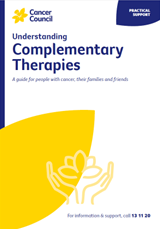- Home
- Cancer Information
- Living well
- Complementary therapies
- Making informed decisions
Making informed decisions
Some people consider using complementary therapies at the time of their diagnosis; others will not think about using them until later, perhaps as part of their recovery or supportive care.
Learn more about:
- Overview
- Choosing a complementary therapy
- Finding a complementary therapist
- Can I help myself or should I see a professional?
- Getting a second opinion
- Costs
- Taking part in a clinical trial
Overview
Complementary therapies can be expensive and time-consuming, and they may not offer any benefits. Deciding whether to use complementary therapies and which ones to choose is a similar process to deciding on a course of conventional treatment.
It is important to ask your cancer specialist, GP and complementary therapist questions. This helps ensure you receive therapies that are suitable for your situation.
It is your decision whether you choose to use complementary therapies. Try to understand as much as possible about each complementary therapy you are considering using, including how it works, possible side effects and costs. This will help you to weigh up the options and make a well-informed decision.
Some people may feel pressure from friends and family to use untested therapies. Knowing that the advice is usually given out of concern, you may feel guilty if you don’t want to try the recommended therapy. However, it’s your right to decide what treatments to have.
Cancer Council warns against delaying or replacing conventional treatment or medicine with a complementary or alternative therapy.
→ READ MORE: Choosing a complementary therapy
Meditation and Relaxation Podcast
Listen to more of our meditation and relaxation podcast for people affected by cancer
More resources
Dr David Joske, Clinical Haematologist, Sir Charles Gairdner Hospital and PathWest, Chairman and Founder Solaris Cancer Care Foundation, Clinical Professor of Medicine, The University of Western Australia, WA; Australasian Integrative Medicine Association (AIMA); Dr Robert Blum, Clinical Director, Cancer Services, Bendigo Health, NSW; Sally Brooks, Senior Pharmacist, Medicines Information, Peter MacCallum Cancer Centre, VIC; Dr Suzanne Grant, Senior Research Fellow, NICM Health Research Institute, Western Sydney University, and Chris O’Brien Lifehouse, NSW; Prof Danforn Lim, Adjunct Professor and Advisory Board Member, NICM Health Research Institute, Western Sydney University, and Adjunct Professor, UTS, NSW; Christina Line, Statewide Services Senior Coordinator, Cancer Council WA; Jen McKenzie, Physiotherapist (Lymphoedema) and ESSA Accredited Exercise Physiologist, The McKenzie Clinic, QLD; Simone Noelker, Wellness Centre and Pastoral Care Manager, Ballarat Regional Integrated Cancer Centre, VIC; Dr Nirzari Pandit, General Practitioner, RACGP Specific Interests Integrative Medicine Group, NSW; Georgie Pearson, Consumer; Cris Pirone, Counsellor, Cancer Council SA; Dr Elysia Thornton-Benko, Specialist General Practitioner, and UNSW Research Fellow, NSW; Kirsty Trebilcock, 13 11 20 Consultant, Cancer Council SA.
View the Cancer Council NSW editorial policy.
View all publications or call 13 11 20 for free printed copies.
Need to talk?
Support services
Coping with cancer?
Speak to a health professional or to someone who has been there, or find a support group or forum
Looking for transport, accommodation or home help?
Practical advice and support during and after treatment
Cancer information
Dealing with the diagnosis
Common reactions to a cancer diagnosis and how to find hope
Explore our resource hub
Explore and download our booklets, fact sheets, podcasts, webinars and videos for people affected by cancer

